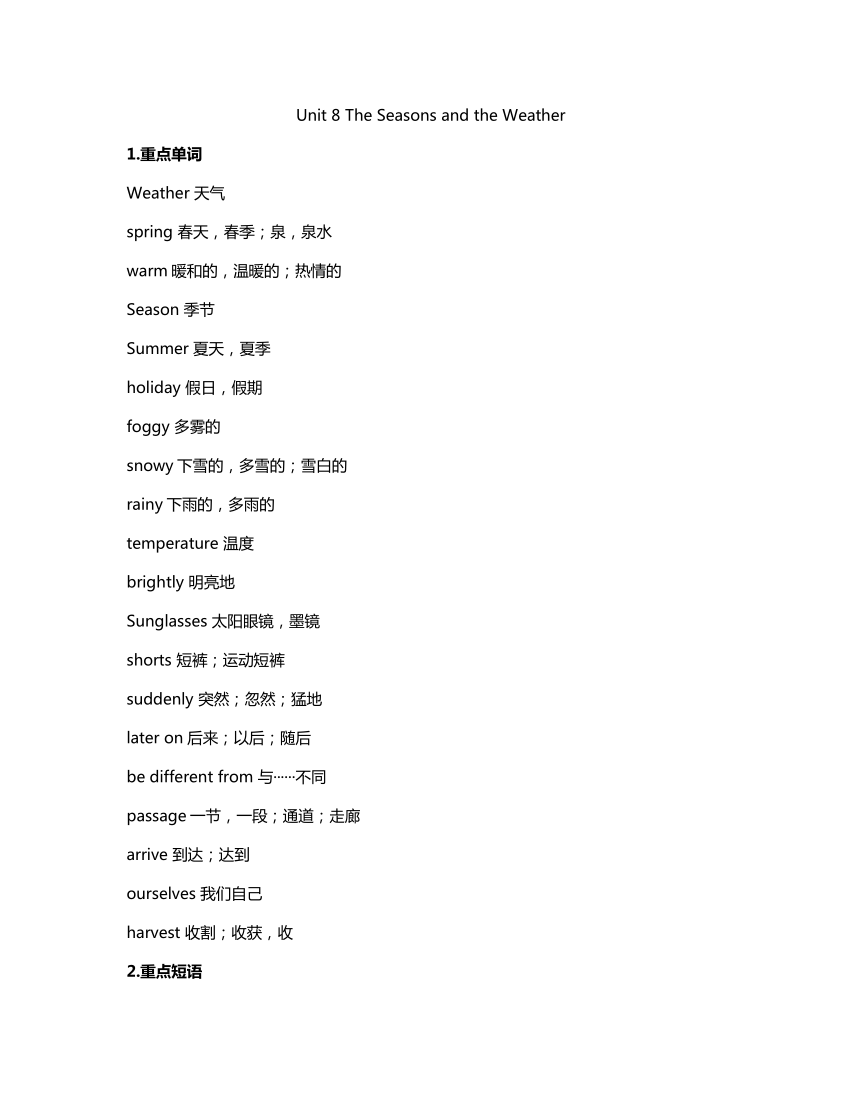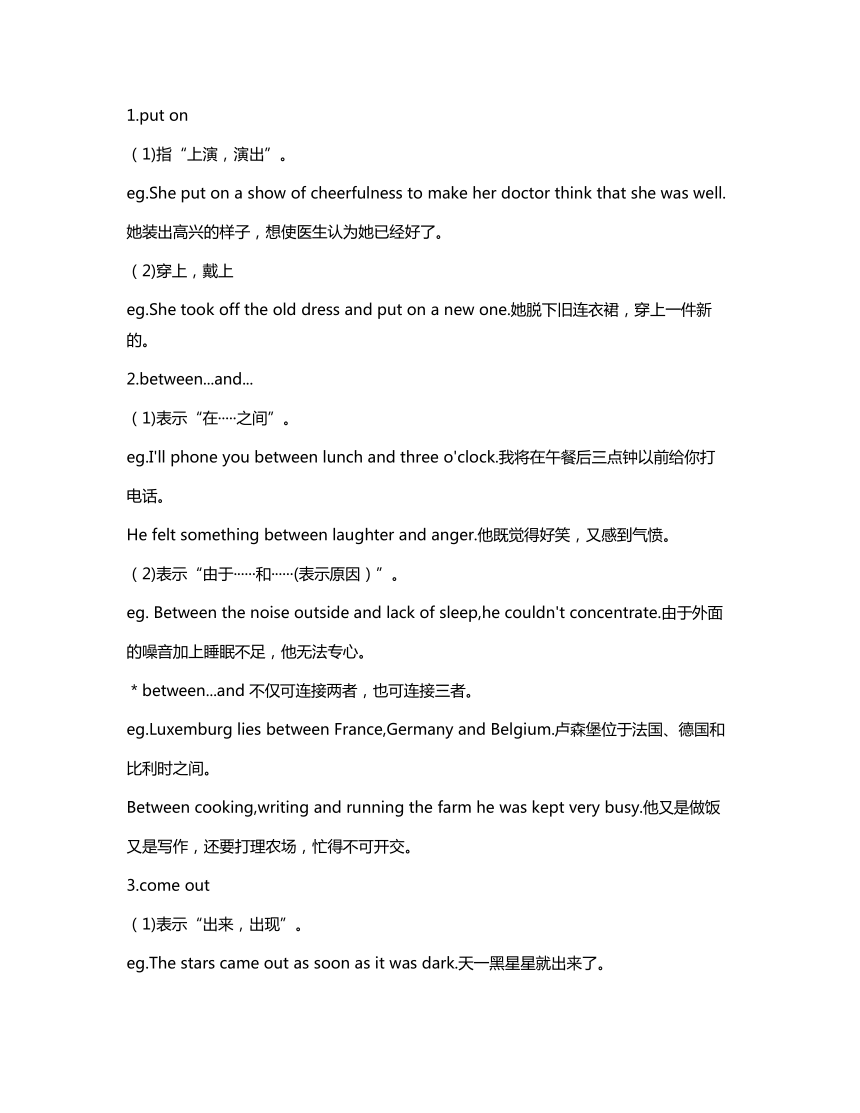Unit 8 The seasons and the Weather知识点归纳(词汇 重点短语 语法总结)
文档属性
| 名称 | Unit 8 The seasons and the Weather知识点归纳(词汇 重点短语 语法总结) |

|
|
| 格式 | zip | ||
| 文件大小 | 78.5KB | ||
| 资源类型 | 教案 | ||
| 版本资源 | 仁爱科普版 | ||
| 科目 | 英语 | ||
| 更新时间 | 2020-06-13 00:00:00 | ||
图片预览


文档简介
Unit
8
The
Seasons
and
the
Weather
1.重点单词
Weather
天气
spring
春天,春季;泉,泉水
warm暖和的,温暖的;热情的
Season
季节
Summer
夏天,夏季
holiday
假日,假期
foggy
多雾的
snowy下雪的,多雪的;雪白的
rainy下雨的,多雨的
temperature
温度
brightly
明亮地
Sunglasses
太阳眼镜,墨镜
shorts
短裤;运动短裤
suddenly
突然;忽然;猛地
later
on后来;以后;随后
be
different
from
与······不同
passage一节,一段;通道;走廊
arrive
到达;达到
ourselves
我们自己
harvest
收割;收获,收
2.重点短语
1.put
on
(1)指“上演,演出”。
eg.She
put
on
a
show
of
cheerfulness
to
make
her
doctor
think
that
she
was
well.
她装出高兴的样子,想使医生认为她已经好了。
(2)穿上,戴上
eg.She
took
off
the
old
dress
and
put
on
a
new
one.她脱下旧连衣裙,穿上一件新的。
2.between...and...
(1)表示“在·····之间”。
eg.I'll
phone
you
between
lunch
and
three
o'clock.我将在午餐后三点钟以前给你打
电话。
He
felt
something
between
laughter
and
anger.他既觉得好笑,又感到气愤。
(2)表示“由于······和······(表示原因)”。
eg.
Between
the
noise
outside
and
lack
of
sleep,he
couldn't
concentrate.由于外面
的噪音加上睡眠不足,他无法专心。
*between...and
不仅可连接两者,也可连接三者。
eg.Luxemburg
lies
between
France,Germany
and
Belgium.卢森堡位于法国、德国和
比利时之间。
Between
cooking,writing
and
running
the
farm
he
was
kept
very
busy.他又是做饭
又是写作,还要打理农场,忙得不可开交。
3.come
out
(1)表示“出来,出现”。
eg.The
stars
came
out
as
soon
as
it
was
dark.天一黑星星就出来了。
(2)表示“出版,发表”。
eg.That
magazine
comes
out
every
Sunday.那份杂志每个周日出版。
(3)表示“开花,结果”。
eg.Some
flowers
have
begun
to
come
out.有些花现已经开始开花了。
4.such
as
表示举例,意为“例如,诸如此类的,像·····那样的”,相当于like或for
example.
eg.There
are
few
poets
such
as
Keats
and
Shelly.像济慈和雪莱这样的诗人现在很
少了。
Animals
such
as
rabbits
and
deer
continue
to
be
active
all
winter,finding
food
wherever
they
can.像兔和鹿这样的动物整个冬天都是很活跃的,它们到处寻找食物。
5.right
away
意为“立即、马上、即刻”,语气稍弱于
at
once,强调动作迅速,可用于过去或将来时态。
eg.He
didn't
answer
right
away.他没有马上
回答。
*拓展
right
now
意为“现在、此时此刻”,也有立即、马上的意思,一般用于现在或者将来时态。
eg.Where
is
the
International
Space
Station
right
now?国际空间站现在在什么位置?
6.and
so
on常用短语,用于列举事物。
eg.China
has
many
big
cities,such
as
Beijing,
Shanghai,Shenzhen
and
so
on.中国有很多大城市,比如北京、上海、深圳等等。
3.语法总结
一般现在时与一般过去时的区别
1.一般现在时表示现阶段发生的动作或状态,以及永恒不变的事实、真理和自然规律,常与时间状语
today,every
day,on
Sunday,every
morning
等连用。
eg.We
sometimes
go
to
the
park
on
Sunday.我们通常星期天去公园。
He
said
spring
returns
in
March.他说春天在三月到来。
2.一般过去时表示过去阶段发生的动作或状态,常与时间状语
yesterday,last
year,the
daybefore
yesterday,the
month
before,this
morning,five
days
ago
等连用。
eg.What
day
was
yesterday?昨天星期几?
We
sometimes
went
to
the
park
on
Sunday
last
year,去年我们通常在周天去
公园。
一般过去式的特殊疑问句
基本结构“特殊疑问词+一般疑问句语序”,如果有时间状语,注意选择对应过去时间的词。
eg.When
did
you
go
there?你什么时候去过那的?
What
did
he
buy
yesterday?他昨天都买什么了?
Where
were
you
last
night?昨晚你在哪?
How
did
she
manage
to
do
that?她是怎么做到的?
动词不定式作宾语
1.有些及物动词,如afford,need,agree,ask,decide,choose,hope,offer,plan,hate,refuse
等用不定式做宾语,结构为“动词+不定式”。
eg.He
offered
to
help
me.他表示愿意帮助我。
He
decided
to
buy
a
new
car.他决定买辆新车。
2.有些动词如
ask,help,like,love,need,prefer,want,choose
等除了可以用不定式作宾语,还可以用不定式作补语,即:动词+宾语十不定式。
eg.I
like
you
to
keep
everything
tidy.(宾语补足语)我喜欢你使每件东西都保持整洁。
3.有些动词或动词词组,如decide,know,show,tell,forget,remember,learn,find
out
等可以用“疑问词加不定式”结构作宾语。
eg.Please
show
us
how
to
do
that.请演示给我们如何去做。
They
haven't
decided
whether
to
accept
the
invitation.他们还没有决定是否接受
邀请。
4.find/feel/think+it+adj./n.+to
do
sth.句型中it是形式宾语,真正的宾语是后面的动
词不定式。
eg.The
man
downstairs
found
it
difficult
to
get
to
sleep.楼下的人发觉难以入睡。
8
The
Seasons
and
the
Weather
1.重点单词
Weather
天气
spring
春天,春季;泉,泉水
warm暖和的,温暖的;热情的
Season
季节
Summer
夏天,夏季
holiday
假日,假期
foggy
多雾的
snowy下雪的,多雪的;雪白的
rainy下雨的,多雨的
temperature
温度
brightly
明亮地
Sunglasses
太阳眼镜,墨镜
shorts
短裤;运动短裤
suddenly
突然;忽然;猛地
later
on后来;以后;随后
be
different
from
与······不同
passage一节,一段;通道;走廊
arrive
到达;达到
ourselves
我们自己
harvest
收割;收获,收
2.重点短语
1.put
on
(1)指“上演,演出”。
eg.She
put
on
a
show
of
cheerfulness
to
make
her
doctor
think
that
she
was
well.
她装出高兴的样子,想使医生认为她已经好了。
(2)穿上,戴上
eg.She
took
off
the
old
dress
and
put
on
a
new
one.她脱下旧连衣裙,穿上一件新的。
2.between...and...
(1)表示“在·····之间”。
eg.I'll
phone
you
between
lunch
and
three
o'clock.我将在午餐后三点钟以前给你打
电话。
He
felt
something
between
laughter
and
anger.他既觉得好笑,又感到气愤。
(2)表示“由于······和······(表示原因)”。
eg.
Between
the
noise
outside
and
lack
of
sleep,he
couldn't
concentrate.由于外面
的噪音加上睡眠不足,他无法专心。
*between...and
不仅可连接两者,也可连接三者。
eg.Luxemburg
lies
between
France,Germany
and
Belgium.卢森堡位于法国、德国和
比利时之间。
Between
cooking,writing
and
running
the
farm
he
was
kept
very
busy.他又是做饭
又是写作,还要打理农场,忙得不可开交。
3.come
out
(1)表示“出来,出现”。
eg.The
stars
came
out
as
soon
as
it
was
dark.天一黑星星就出来了。
(2)表示“出版,发表”。
eg.That
magazine
comes
out
every
Sunday.那份杂志每个周日出版。
(3)表示“开花,结果”。
eg.Some
flowers
have
begun
to
come
out.有些花现已经开始开花了。
4.such
as
表示举例,意为“例如,诸如此类的,像·····那样的”,相当于like或for
example.
eg.There
are
few
poets
such
as
Keats
and
Shelly.像济慈和雪莱这样的诗人现在很
少了。
Animals
such
as
rabbits
and
deer
continue
to
be
active
all
winter,finding
food
wherever
they
can.像兔和鹿这样的动物整个冬天都是很活跃的,它们到处寻找食物。
5.right
away
意为“立即、马上、即刻”,语气稍弱于
at
once,强调动作迅速,可用于过去或将来时态。
eg.He
didn't
answer
right
away.他没有马上
回答。
*拓展
right
now
意为“现在、此时此刻”,也有立即、马上的意思,一般用于现在或者将来时态。
eg.Where
is
the
International
Space
Station
right
now?国际空间站现在在什么位置?
6.and
so
on常用短语,用于列举事物。
eg.China
has
many
big
cities,such
as
Beijing,
Shanghai,Shenzhen
and
so
on.中国有很多大城市,比如北京、上海、深圳等等。
3.语法总结
一般现在时与一般过去时的区别
1.一般现在时表示现阶段发生的动作或状态,以及永恒不变的事实、真理和自然规律,常与时间状语
today,every
day,on
Sunday,every
morning
等连用。
eg.We
sometimes
go
to
the
park
on
Sunday.我们通常星期天去公园。
He
said
spring
returns
in
March.他说春天在三月到来。
2.一般过去时表示过去阶段发生的动作或状态,常与时间状语
yesterday,last
year,the
daybefore
yesterday,the
month
before,this
morning,five
days
ago
等连用。
eg.What
day
was
yesterday?昨天星期几?
We
sometimes
went
to
the
park
on
Sunday
last
year,去年我们通常在周天去
公园。
一般过去式的特殊疑问句
基本结构“特殊疑问词+一般疑问句语序”,如果有时间状语,注意选择对应过去时间的词。
eg.When
did
you
go
there?你什么时候去过那的?
What
did
he
buy
yesterday?他昨天都买什么了?
Where
were
you
last
night?昨晚你在哪?
How
did
she
manage
to
do
that?她是怎么做到的?
动词不定式作宾语
1.有些及物动词,如afford,need,agree,ask,decide,choose,hope,offer,plan,hate,refuse
等用不定式做宾语,结构为“动词+不定式”。
eg.He
offered
to
help
me.他表示愿意帮助我。
He
decided
to
buy
a
new
car.他决定买辆新车。
2.有些动词如
ask,help,like,love,need,prefer,want,choose
等除了可以用不定式作宾语,还可以用不定式作补语,即:动词+宾语十不定式。
eg.I
like
you
to
keep
everything
tidy.(宾语补足语)我喜欢你使每件东西都保持整洁。
3.有些动词或动词词组,如decide,know,show,tell,forget,remember,learn,find
out
等可以用“疑问词加不定式”结构作宾语。
eg.Please
show
us
how
to
do
that.请演示给我们如何去做。
They
haven't
decided
whether
to
accept
the
invitation.他们还没有决定是否接受
邀请。
4.find/feel/think+it+adj./n.+to
do
sth.句型中it是形式宾语,真正的宾语是后面的动
词不定式。
eg.The
man
downstairs
found
it
difficult
to
get
to
sleep.楼下的人发觉难以入睡。
同课章节目录
- Unit 5 Our school life
- Topic 1 I usually come to school by subway.
- Topic 2 A few students are running around the play
- Topic 3 My school life is very interesting.
- Unit 6 Our local area
- Topic 1 Is there a computer in your study?
- Topic 2 My home is in an apartment building.
- Topic 3 Which is the way to the hospital?
- Review of Units 5-6
- Unit 7 The Birthday
- Topic 1 When is your birthday?
- Topic 2 Can you sing an English song?
- Topic 3 Everyone had a good time.
- Unit 8 The seasons and the Weathe
- Topic 1 What's the weather like in summer?
- Topic 2 The summer holidays are coming.
- Topic 3 Let’s celebrate!
- Review of Units 7-8
- 旧版资料
- Unit 5 Our School Life
- Unit 6 Our Local Area
- Unit 7 The Birthday
- Unit 8 The seasons and the Weathe
- Unit 7 Celebrating the Birthday(老版本)
